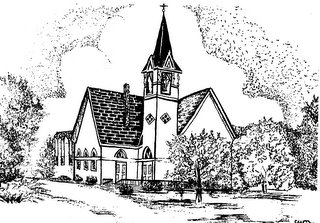
Hebrews 4:14-5:10 [NRSV]
Since, then, we have a great high priest who has passed through the heavens, Jesus, the Son of God, let us hold fast to our confession. For we do not have a high priest who is unable to sympathize with our weaknesses, but we have one who in every respect has been tested as we are, yet without sin. Let us therefore approach the throne of grace with boldness, so that we may receive mercy and find grace to help in time of need.
Every high priest chosen from among mortals is put in charge of things pertaining to God on their behalf, to offer gifts and sacrifices for sins. He is able to deal gently with the ignorant and wayward, since he himself is subject to weakness; and because of this he must offer sacrifice for his own sins as well as for those of the people. And one does not presume to take this honor, but takes it only when called by God, just as Aaron was.
So also Christ did not glorify himself in becoming a high priest, but was appointed by the one who said to him, "You are my Son, today I have begotten you"; as he says also in another place, "You are a priest forever, according to the order of Melchizedek."
In the days of his flesh, Jesus offered up prayers and supplications, with loud cries and tears, to the one who was able to save him from death, and he was heard because of his reverent submission. Although he was a Son, he learned obedience through what he suffered; and having been made perfect, he became the source of eternal salvation for all who obey him, having been designated by God a high priest according to the order of Melchizedek.
I’m walking into a trap this morning and I just want to acknowledge that from the outset. When I decided to go off the lectionary for a few weeks and address topics that were submitted to me I knew there would be some challenges and today I’m walking into one of them. There is no way to talk about The Da Vinci Code and how Christians ought to respond to it without stepping on some dangerous stones. But here I go. I’ll try to be nuanced, balanced and fair. I’ll try to speak in elevated terms that respect the kind of discourse we want to have about this book and movie. And here’s what I want to say: This book is bad.
It’s not just bad, it’s downright awful. It’s not just awful; I was embarrassed to be seen with it. When I took it out in public I wanted a brown paper bag to carry it in. I groaned out loud when I read it. There were two occasions when I threw the book across the room in sheer frustration. The characters were paper-thin and unrealistic. The tone of the book was condescending and ludicrous. The references to Christian history were ridiculous and wrong. And the plot was more like a mathematical puzzle constructed by conspiracy theorists than anything resembling real life. I’ve read phone books with better writing. But other than that, I liked it.
O.K., I walked right into the trap there. I admit that I’m in the minority on this. I’ve been conducting an informal poll with everyone I’ve met over the last few weeks and I’m about the only one I know who feels like this. I must be a snob. I’m right about this, but I’ll admit to being a snob. Most folks, including Suzanne, have enjoyed the book. “Lighten up,” they say to me. “It’s just a mindless piece of beach fiction. It’s a page-turner. It has suspense and drama and action. It reads like a movie. Sure the theology is bad, but it’s fiction. Just enjoy it for what it is, Alex. And by the way, speaking of mindless entertainment, didn’t I see you watching American Idol the other night?” And to that I say, “That is beside the point and Taylor Hicks IS going to win that thing.”
The point is that The Da Vinci Code is not something we can ignore. I don’t think it’s worth a boycott and it’s certainly not something that threatens the faith. But it raises questions that tell us something about where we are as a culture and the kinds of questions we are asking about the Christian faith. It is a book about deep suspicions and even though Dan Brown, the author, goes way off track in identifying the source of those suspicions, despite himself he hits on some strong themes that resonate with us as contemporary people.
So what is The Da Vinci Code? It is a book, and now a movie, which is built around the notion that there is a dark secret that the Catholic Church does not want you to know about. That secret is that Jesus was not crucified, but that instead he survived and married Mary Magdalene, one of the women who followed him. Not only that, but they had children and the line of their descendents survived in France. The book suggests that this was pretty common knowledge and that no one considered Jesus to be divine until the 4th century when Constantine, the Roman Emperor of the day, called a Council of Christian bishops at Nicaea to declare that Jesus was not only human but divine also. This solidified a patriarchal understanding of Christianity that denied the ancient notion of the “sacred feminine” and from then on the church systematically subjugated the dangerous knowledge of Jesus’ humanity and the role of women.
A secret society called the Priory of Sion was formed in the Middle Ages when documents substantiating Jesus’ marriage were found during the Crusades in Jerusalem. Members of the Priory included the Renaissance painter Leonardo da Vinci who painted clues into his most famous works, including the Last Supper which supposedly includes a figure who looks like a woman. I don’t know who played that character in the play here last year but it might have changed how you approached the role.
The Church hierarchy lived in fear that the Priory would eventually reveal the truth and was willing to resort to murder using its most loyal order, the Opus Dei, and an albino monk, to carry out the murders. I could go on, but it’s really not worth it. The point is summed up by one of the smug, self-satisfied scholars who star in the book who proclaims that “almost everything our fathers taught us about Christ is false” [p. 255] and the way the story is told now serves the interests of the powerful.
I could walk deeper into the trap this morning and begin to address the many, many liberties and outright fabrications Dan Brown draws on to construct his book, but I don’t want to do that. I’ve given you some book references in the bulletin if you want to follow up on that. Suffice it to say that Dan Brown’s mode of operation is to take a lot of pieces of real things that you have only half-heard of and to string them together into a creative, alternate, totally fictional history of the Church. As the columnist Mark Steyn says, “it rhythmically supports the impression that this is not a work of fiction, but a documentary unlocking of a two-millennia-old secret.”[1] But to take it on as a documentary would be to take you too far from the gospel this morning, and that is what I am charged to do in this place – to preach the gospel, which is not anything like the pseudo-gospel of Dan Brown.
The problem with Dan Brown’s book is not that it’s outrageously unbelievable. The truth of the matter is that his version of events is really very believable. Robin Griffith-Jones, who is the master of the Temple Church in London, one of the sites featured prominently in the book, was asked recently about how he responds to tourists who come asking about the claims of the book. He answered, “The novel’s characters say that Jesus was a married man and a father. We say he was born of a virgin, walked on water, raised people from the dead and came out of his own grave. Which of these accounts, to a neutral observer, seems more fantastical? I think it’s time we admit that our claims are bizarre—and then people will respect us when we explain why we think these claims should be believed.”[2]
C.S. Lewis was one who felt that the surprising things about Christianity, the unbelievable things, were the things that spoke most powerfully for it. He said, "Reality, in fact, is always something you couldn't have guessed. That's one of the reasons I believe Christianity. It's a religion you couldn't have guessed."[3] Books like The Da Vinci Code, which present us with a Jesus who does only what we might expect a man to do, actually give us a much less interesting Jesus, one who conforms more to our expectations when what we really need is a savior who upsets our expectations and sets us free from them for God’s new thing.
Has the Church, in the past and into the present, been guilty of downgrading the role and inherent dignity of women, of treating them as second-class citizens and acting as if the stories of men were more important? Absolutely. But creating a Jesus who looks like a 21st century feminist with a liberated woman by his side doesn’t liberate us because it is one more example of how we create Jesus in our own image.
Has the Church, in the past and into the present, been guilty of favoring the interests of the powerful over the needs of the powerless? You know that it has been. But a solely human Jesus who tells us that we should beware the addiction of power and to take care of the poor is far less effective an agent than a divine Jesus who emptied himself, taking the form of a slave, and being found in human likeness, humbled himself and became obedient unto death – even death on a cross [Phi. 2:6-8]. The Church is always in danger of corrupting the message and acting in ways that deny the good news, but that is why it is so important that our founder is not just “a good guy”, a “great and powerful man” with “substantial influence and importance”, as The Da Vinci Code puts it [p. 254]. Unless we are inviting people into an encounter with the Living Jesus who has overcome death and who is offering us that same resurrection victory, how can we hope to be anything but the corrupt human institution some suspect us to be?
The Archbishop of Canterbury, Rowan Williams, says that it should not be surprising that the contemporary world is attracted to stories that promise a new revelation about Jesus. He points not only to Dan Brown’s book but also to the attention given to the recently released “Gospel of Judas,” a text, much younger than the New Testament, which presents a new image of Judas and Jesus. Williams says we treat our biblical texts these days “as if they were unconvincing press releases from some official source, whose intention is to conceal the real story; and that real story waits for the intrepid investigator to uncover it and share it with the waiting world. Anything that looks like the official version is automatically suspect. Someone is trying to stop you finding out what really happened, because what really happened could upset or challenge the power of officialdom.”[4]
“We don’t trust power,” Williams says, and we long for stories that will tell us “what really happened.” We long for stories that will tell us the answers to the great mysteries of life. When those stories come attached to power structures that downgrade the role and status of women, we suspect they may not be holy. That’s one of the reasons we question the impact of Islam on the treatment of women in some societies. When those stories that would tell us about the holy advocate violence and killing, when they speak only of judgment and not of grace, when they favor one race or one people over another, when they discourage continuing inquiry and study rather than fostering continued growth and understanding…then we suspect there is something we are not being told.
But the Bible keeps taking us back to the Jesus we still don’t know. The Bible, to quote Williams again, “is not the authorized code of a society managed by priests and preachers for their private purposes, but the set of human words through which the call of God is still uniquely immediate to human beings today, human words with divine energy behind them.”[5] The Jesus we meet in the Bible is not inviting us to “step up” into a society of the elite, but to “step in” to the reign of heaven. In doing this we don’t go to meet a Jesus we can get our minds around and comprehend – we go to be transformed by a Jesus who has what we need to be saved. And Jesus only has what we need if he is more than human…much more human. He was fully human, flesh of our flesh and bone of our bone. But he was also the Word, God, made flesh.
When the writer of Hebrews got around to describing who Jesus was, the language he had available (and who knows, the writer could have been a she. Perhaps it’s a great cover-up!)…the language available to the writer was the language of the Temple. In the Temple in Jerusalem, the high priests would intercede before God, asking that God accept the sacrifices offered for the forgiveness of sins. In Jesus we have the great high priest, the one who can intercede for us because he knew what it meant to be human. He knew our weaknesses.
But he also knew the glory of the heavens because he was God’s own Son…he was God. And that changed everything. Now we have no reason to fear to go before God. We go with our brother Jesus, who took the road to the cross, to the tomb, and to the glory of the empty tomb. We can be bold in God’s presence because God has come boldly into our presence.
At the end of the day, no human story can change the world, not even one that has attracted as much attention as The Da Vinci Code. And whether you read it or not, whether you see the movie or not, whether you share my snobbish opinion about its quality and merit or not, really does not affect the fate of your soul or the possibility of your salvation. There shouldn’t be any prohibition from setting our minds to wonder about the mysteries of the universe, the power of religious symbols, and the intricacies of human understanding.
But I hope that you will not neglect the story that really does make a difference and on which the universe itself hangs…the story of a fiercely, loving God who loved the world so much that it became God’s home…the story of a fiercely, loving God who loves you so much that God will not let you go and will not leave you alone until you accept that love as yours. It takes more than Dan Brown’s Jesus to tell that story. That’s a story you meet in a place like this, among people like those very human people sitting next to you this morning. That’s a story that is as real and authentic as it gets. Christ is alive. Thanks be to God.
[1] “The Da Vinci Code: bad writing for Biblical Illiterates,” 5/10/06, www.macleans.ca.
[2] “Teaching Moment: Temple Church and The Da Vinci Code,” 5/15/06, Christian Century
[3] The Case for Christianity
[4] “Sermon for Easter Day,” Canterbury Cathedral, 4/16/06
[5] Ibid.







